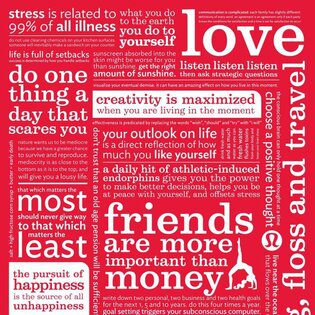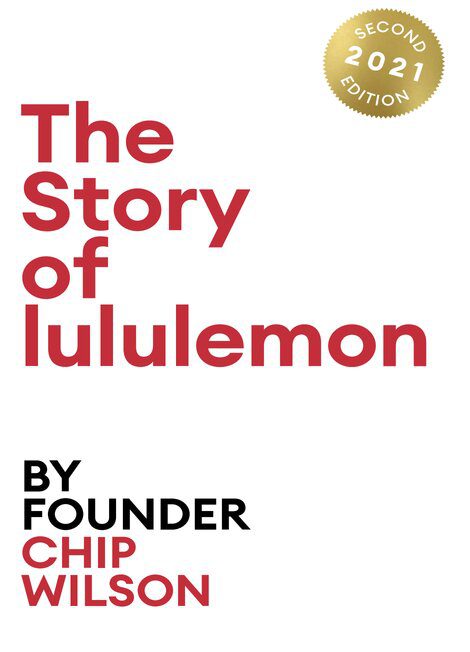Don’t waste a second of your life. You only have 40,000 days to live. The longer you live, the quicker time goes. To a toddler, 10 minutes feels like 10 years. To a 90-year-old man, 10 days feels like half a second.
In The Story of Lululemon: Little Black Stretchy Pants, Entrepreneur and Founder of yoga-inspired athletic apparel company Lululemon Athletica, Chip Wilson writes about founding Lululemon, creating company culture, lessons learned, building great corporate governance, working with family members, his thought process and insights he garnered along the way.
Chip is a voracious reader and he recommends loads of business books.
Favourite Takeaways: The Story of Lululemon by Chip Wilson
Lululemon was a social experiment to determine if putting people’s development above profits would yield extraordinary profits. The experiment proved successful.
Implosion
In 2013, just when five years of exponential growth was in its infancy, when the way people dressed was at the precipice of the most significant change in history, lululemon self-imploded.
The company went from owning 95 percent of the women’s technical apparel market in 2011 to 10 percent in 2018
- There are two parts to a successful business. First, there is the product and customer—the two aspects which started the business in the first place. This is the part the entrepreneur knows better than anyone in the world.
- Second, there is the business of public board governance. It includes the Machiavellian power moves and survival struggles of top executives and board members. This is generally not something the entrepreneur knows very well—certainly not as well as he or she knows the product and the customer.
With my first company Westbeach, it was the rise of the surf, skate, and snowboard culture from 1979 to 1997. In 1998, I had the same sense that something big was about to happen with yoga.
Bet on yourself – started at 42
“I had no way of knowing just how huge yoga would be—and how lululemon would explode like nothing else. The little company that I founded in Kitsilano, Vancouver would go on to redefine how a generation of people dressed and lived. The financial rewards for my family and me would be enormous, but at the time I was rolling the dice. I could have just as easily lost everything multiple times. The journey was exhilarating and terrifying. I was forty-two, I had a young family, and I bet the farm.”
Over the last year, the evolution from surf to skateboard had only become more pronounced. It was obvious to me that skateboarding, like surfing, would be a billion-dollar industry over the next five years. What was less clear, was what I needed to do to capitalize on that evolution.
Trend Spotting
Because shorts designed specifically for an athletic body looked so good, girls everywhere wanted their boyfriends to wear the same shorts. As with other trends, I sensed what was happening on the West Coast would make its way to the rest of the world. There was an opportunity here for me if I could figure out how to take advantage of it.
An Act is learned early in life when a child faces a perceived moment of survival and develops a strategy to help them survive the situation. For the balance of a person’s life, their Act—effective or not—subconsciously kicks in whenever the person perceives themselves to be in a threatened position.
With my first company, Westbeach, I believed I could never go on vacation, take days off, and that I had to be in on every single move and decision. I would make a lot of mistakes trying to do it all on my own and not recognizing that people love to help someone who’s passionate and working hard.
Freeing self from past experience
We all have experiences in our past that cut us off from our future potential. This is something personal development has helped me better understand. Our past experiences subconsciously confine what we believe is possible in life. If something didn’t work when I was thirteen, it doesn’t mean it won’t work at another time in my life.
Runner’s High
The runner’s high is a sensation that occurs after thirty-five minutes of a sustained, high-rate heartbeat. The brain releases hormones which take the athlete into an energized mental and physical space. The sensation usually lasts for about four hours. The amazing thing about an athlete’s high is the person’s past disappears and is irrelevant.
During that high, as the past becomes blank, so too does the future. We can only think of the future based on what we know from our past. When we don’t focus on the past, and the future is eliminated, all that is left is the present. The present is where all life really occurs. This was the origin of “The meaning of life may be living in the moment,” which became a key part of lululemon’s Manifesto”
Training your brain – Read a Novel a day Goal
Around that same time, my mom sent me an article from the New York Times. (I believe the author was named Art Buchwald.) The article drew connections between the human body and athletics and how the brain worked.
There was research showing the brain improved from mental gymnastics in the same way the body improved from athletic conditioning—say, from swimming drills, for example.
You had to train the brain, Buchwald suggested, as you would your muscles, for it to work at full capacity. Even as a 19-year-old, I understood this clearly. For 1975, this was radical thinking.
I started off with a list of the top 100 books of all time that I had seen in a newspaper. This undertaking made me likely one of the best-read 19-year-olds in the world.
Swimming and Goal Setting
Swimming had given me a decade of goal-setting experience. For each age group, there was a definable record time I had to beat, and I had to beat it by my birthday before moving into the next age group.
Looking further into the future, I set the goal of owning my own house by twenty, running my own business by age thirty and being retired by forty (meaning I would be 100 percent in control of my whole life). Running my own business was in my blood because I was creative, stubborn, stupid, and unstoppable.
At the very least it would mean I wasn’t trading my life for money on someone else’s terms. This might seem like the daydreams of a nineteen-year-old working in the middle of nowhere, making good money for the first time in his life, but to me, my goals were a serious, authentic way of envisioning the years to come.
In life, there’s no performance without action.
Partnership
In a partnership, an aspiring entrepreneur can learn how a different combination of skill sets need to come together to make the business work. You need a designer/creative and visionary, you need someone with a good sense of structure and accounting, and you need someone who’s a people person, a genuine lover of people, to handle sales. It’s almost impossible to find all these skills in one person.
Masking pain
After my exposure to yoga, there was a brief period where I tried to ignore my creative impulses. I tried to ignore the urge to take a chance. If I stuck with the idea of being a barista, I could avoid years of uncertainty, stress, hard work, mounting responsibilities, and fiscal pressure. I could run from the way of life I’d been so glad to leave behind when we sold Westbeach.
Following Intuition
No matter what I told myself, my creative urges intensified. I knew that I could spot athletic trends five to seven years before they emerged, and I knew that this was what was occurring for me now. I was also forty-two and mindful of the fact that my goal had been to retire at forty. I let my mind wander, and, rather than coming up with reasons not to start another business, I simply decided that if I started a new venture, I would approach it differently.
Listening to Audiobooks
I’d started Westbeach with little capital and little experience. Now that I had a good amount of both, I could begin with a blank slate and create something in-line with my beliefs. Many of these beliefs were formed by the many audiobooks I’d listened to on the six-hour return car rides from Vancouver to the Morrow offices in Salem. I’d listened to just about every audiobook I could find on business success, self-development, and the realization of human potential.
From this listening, I concluded that four of the audiobooks summed up the other ninety-six. These main four comprised the philosophical, cultural, and people development ideas I wanted to use to form the basis of my new company. These audiobooks were:
- The Goal by Eliyahu Goldratt—a fun, fictional novel describing manufacturing bottlenecks, opportunities, and overall theory of constraints.
- The 7 Habits of Highly Effective People by Stephen Covey
- The Psychology of Achievement by Brian Tracy—how to be a great citizen, parent, and goal-setter.
- Good to Great, Jim Collins—the concept is “good” is the enemy of “great,” and a “Level 5 leader” has trained a replacement better than themselves.
- The fifth addition to this list is not an audiobook, but a course, The Landmark Forum.
Lululemon’s linguistic abstraction was composed of a series of twenty to thirty terms and definitions that arose from the previously-listed books, audiobooks, and participation in the Landmark programs.
One of lululemon’s very earliest Operating Principles was never to tell a customer something looked good on them. We assumed our intelligent ccustomer did not need to be talked down to. Talking fashion used up our customers’ time; it was fake and added nothing to the experience.

Goal Setting
There are always those who won’t try goal-setting because they fear the feeling of failure if a goal is not attained. In my view, learning to fail might be the most crucial learning of all. Most people don’t like goal-setting because it makes them responsible for their lives and what they get out of them. Often, people want to dream about their ideal life, and then vote for people they think will give it to them without their actually having to work for it.
6/13 rule
I came up with several new procedures. One was something I called the “6/13 rule”—if a Guest was looking at a product for six seconds, an Educator had a thirteen-second window to educate them about the item. Barring any follow-up questions, the Educator would then leave them alone until they looked at another item for around six seconds.”
There wasn’t anything scientific about it. I’d come up with those numbers by looking at people and observing their body language to see what they were comfortable with. I wanted our Educators to impress customers with their sheer knowledge of and enthusiasm for the item.
No phone answering in store
We broke another retail rule by rarely answering the phones in our store. We would answer the phone if there were no customers on the floor, but our priority was always the Guest who had dedicated their time to come into the store, and who was maybe already at the cash desk. I wanted us to be really, really good at being present with in-person customers.
No Branding/Marketing Team
We didn’t have a brand or marketing team because our brand spend was hidden in people development, quality processes, store locations, and anything else “off the cuff” I wanted to do in response to social changes in the world. Everything we did seemed to strengthen the brand.
Don’t waste a second of your life. You only have 40,000 days to live. The longer you live, the quicker time goes. To a toddler, 10 minutes feels like 10 years. To a 90-year-old man, 10 days feels like half a second. Examine who in your life is eating up your precious seconds
Don’t waste a second of your life. You only have 40,000 days to live. The longer you live, the quicker time goes. To a toddler, 10 minutes feels like 10 years. To a 90-year-old man, 10 days feels like half a second. Examine who in your life is eating up your precious seconds. Who around you complains but doesn’t act? Ask yourself, “What is my real passion? Where do I thrive? Where can I give the most back to the world?” We get too hung up on what our social values and morals say we should do, what our parents or friends say we should do. For this reason, I’m always impressed by people who live their own great life.



1 Comment
Pingback: Quotable Quotes -The Story of Lululemon by Chip Wilson. | Lanre Dahunsi